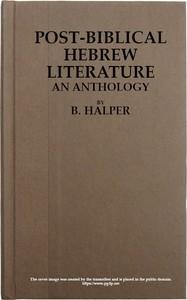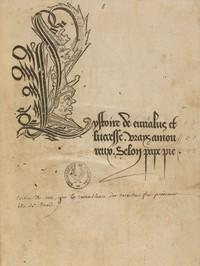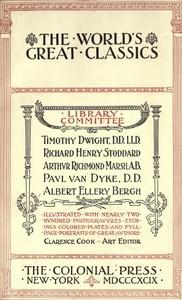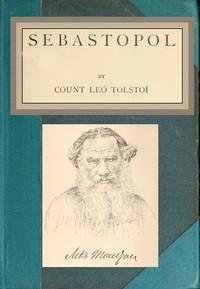Read this ebook for free! No credit card needed, absolutely nothing to pay.
Words: 43446 in 8 pages
This is an ebook sharing website. You can read the uploaded ebooks for free here. No credit cards needed, nothing to pay. If you want to own a digital copy of the ebook, or want to read offline with your favorite ebook-reader, then you can choose to buy and download the ebook.


: Post-Biblical Hebrew Literature: An Anthology by Halper B Translator - Hebrew literature Translations into English
INDEX 339
NEWSPAPER REPORTING AND CORRESPONDENCE
GATHERING THE NEWS
Unlike almost any other profession, that of a newspaper reporter combines two very different activities--the gathering of news and the writing of news. Part of the work must be done in the office and part of it outside on the street. At his desk in the office a reporter is engaged in the literary, or pseudo-literary, occupation of writing news stories; outside on the street he is a detective gathering news and hunting for elusive facts to be combined later into stories. Although the two activities are closely related, each requires a different sort of ability and a different training. In a newspaper office the two activities are rarely separated, but a beginner must learn each duty independent of the other. This book will not attempt to deal with both; it will confine itself mainly to one phase, the pseudo-literary activity of writing news stories.
However, introductory to the discussion of the writing of newspaper stories, we may glance at the other side of the newspaper writer's work--the gathering of the news. Where the newspaper gets its news and how it gets its news can be learned only by experience, for it differs in different cities and with different papers. But an outline of the background of news-gathering may assist us in writing the news after it is gathered and ready for us to write.
The other class includes the stories that break unexpectedly. Accidents, deaths, fires, storms, and other unexpected happenings come without warning and the reporting of them cannot be arranged for in advance. These are the stories that the paper is most anxious to get and the things for which the whole staff always has its eyes and ears open. Seldom are they heard of in time for the paper to have them covered personally, and the reporting of such stories becomes a separate sort of work--the gathering and sorting of the facts that can be obtained only from chance witnesses.
Assignments are used to cover the stories that do not come in through the regular sources, and to handle the big stories that are unearthed on the regular beats. The editor turns over to the reporter the tip that he has received and instructs him to go out and get the facts. A paper's best reporters are used almost entirely on assignments, and when they go out after a story they practically become detectives. They follow every clue that the tip suggests and every clue that is opened up as they progress; they hunt down the facts until they are reasonably sure that they have secured the whole story. The result may not be worth writing, or it may be worth a place on the front page, but the reporter must get to the bottom of it. Whether on a beat or on an assignment every reporter must have his ears open for a tip of some unexpected story and must secure the facts or inform the editor at once. It is in this way that a paper gets a scoop, or beat, on its rivals by printing a story before the other papers have heard of it.
For example, suppose a reporter is sent out to get the story of a fire that has started an hour or two before he goes on duty. All that his editor gives him is the tip from the fire department, or from some other source, of a fire at such-and-such an address. When he arrives at the scene there is nothing left but smoldering ruins with perhaps an engine throwing a stream on the smoking d?bris and a few by-standers still loitering about. He can see with his own eyes what kind of building has burned, and how completely it has been destroyed. A by-stander may be able to tell him who occupied the building or what it was used for, but he must hunt for some one else who can give him the exact facts that his paper wants. Perhaps he can find the tenant and learn from him what his loss has been. The tenant can give him the name of the owner and may be able to tell him something about the origin of the fire. He must find the owner to get the value of the building and the amount of insurance carried. Perhaps he cannot find any of these people and must ask the fire chief or some one else to give him what facts and estimates he can. If the fire is at all serious he must find out who was killed or injured and get their names and addresses and the nature of their injury or the manner of their death. Perhaps he can talk to some of the people who had narrow escapes, or interview the friends or relatives of the dead. Everywhere he turns new clues open up, and he must follow each one of them in turn until he is sure that he has all the facts.
The same is true of every story that is printed in a newspaper. Every story must be secured in the same way--whether it is the account of a business transaction, a bank robbery, a political scandal, a murder, a reception, or a railroad wreck. Seldom is it possible to find any one person who knows all the facts just as the newspaper wants them, and many a story that is worth but a stickful in the first edition is the result of two hours' running about town, half a dozen telephone calls, and a dozen interviews. That is the way the news is gathered, and that is the part of the reporter's work that he must learn by experience. But after all the gathering is finished and he has the facts, the writing of the story remains. If the reporter knows how to write the facts when he has them, his troubles are cut in half, for nowadays a reporter who writes well is considered a more valuable asset than one who cannot write and simply has a nose for news.
The correspondent's work is made more difficult by what is called news values. Distance affects the importance of the facts that he secures and the length of the stories he writes. He must weigh every event for its interest to readers a hundred or a thousand miles away. What may be of immense importance in his community may have no interest at all for readers outside that community. He must see everything with the eyes of a stranger, and this must influence his whole work of news gathering and news writing. This matter will be taken up at greater length in the next chapter.
Write your queries so they can be understood. Never send a "blind" query. If John Smith, a confirmed bachelor, whose age is 80 years, elopes with and marries the daughter of the woman who jilted him when he was a youth, say so in as few words as possible, but be sure to convey the dramatic news worth of the story in your query. Do not say, "Bachelor elopes with girl, daughter of woman he knew a long time ago." In itself the story which this query tells might be worth printing, but it would not be half so good a story as the elopement of John Smith, 80, bachelor, woman hater, with the daughter of his old sweetheart.
Don't stop working on a good story when you have all the facts; if there are photographs to be obtained, get the photographs, especially if the principals in the story are persons of standing, and more especially if they are women.
Free books android app tbrJar TBR JAR Read Free books online gutenberg
More posts by @FreeBooks

: L'Ystoire de Eurialus et Lucresse vrays amoureux selon pape Pie by Pius II Pope Saint Gelais Octavien De Translator - Adultery Fiction; Didactic literature Latin (Medieval and modern) Translations into French FR Poésie; FR Nouveautés; FR Séduction et li


: History of English Literature Volume 2 (of 3) by Taine Hippolyte Van Laun Henri Translator - English literature History and criticism






